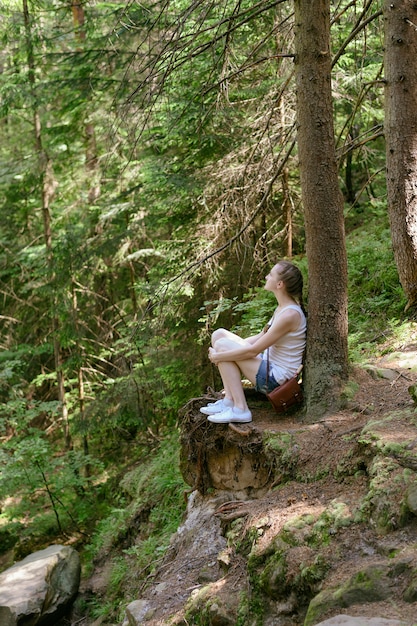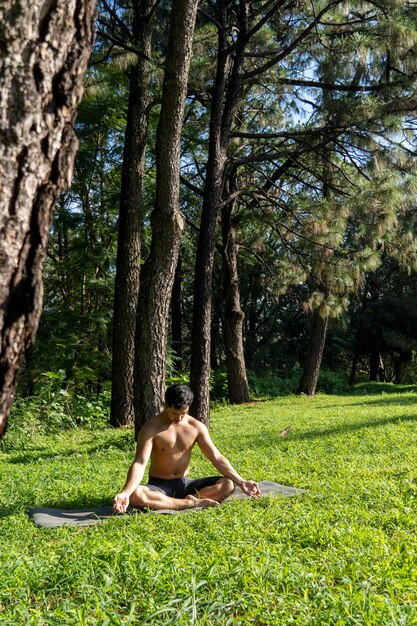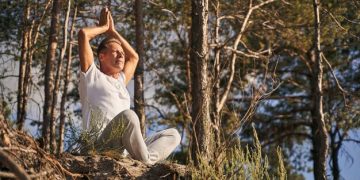The Power of Nature: Reduce Stress in 30 Minutes Outdoors

The Power of Nature: Can Spending Just 30 Minutes Outdoors Reduce Your Stress Levels? Yes, studies show that just 30 minutes spent outdoors in nature can significantly reduce stress levels by lowering cortisol, the body’s primary stress hormone, and improving mood through increased endorphin production.
Discover the power of nature: can spending just 30 minutes outdoors reduce your stress levels? Absolutely! Step outside and unlock nature’s potential for a calmer, healthier you.
Unveiling Nature’s Stress-Busting Secrets
In today’s fast-paced world, stress has become an unwelcome companion for many. But what if there was a simple, accessible, and natural way to combat this pervasive issue? The answer may lie just outside your door: in the embrace of nature.
The benefits of spending time outdoors extend far beyond simply enjoying a change of scenery. Research has consistently shown that even brief exposure to natural environments can have a profound impact on our mental and physical well-being, offering a potent antidote to the stresses of modern life.
The Science Behind Nature’s Calming Effect
The positive influence of nature on our stress levels isn’t just anecdotal; it’s backed by solid scientific evidence. Studies have delved into the physiological mechanisms that explain why spending time outdoors can be so effective in reducing stress and promoting relaxation.
From hormonal changes to neurological responses, the science is clear: nature has a tangible and measurable impact on our well-being.
Cortisol Reduction
One of the key ways nature combats stress is by lowering cortisol levels. Cortisol, often referred to as the “stress hormone,” is released by the body in response to stressful situations. While cortisol is essential for survival, chronic elevation can lead to various health problems.
- Research has demonstrated that spending time in natural environments can significantly reduce cortisol levels.
- A study published in Environmental Science & Technology found that participants who spent time in a forest had lower cortisol levels compared to those who spent time in an urban environment.
- These findings suggest that nature has a direct impact on our hormonal balance, helping to mitigate the physiological effects of stress.

The Role of Endorphins
Endorphins, often called “feel-good” hormones, are another crucial component of nature’s stress-reducing power. These naturally occurring chemicals act as pain relievers and mood elevators, promoting feelings of happiness and well-being.
- Exercise, sunlight exposure, and even simply being in a pleasant environment can stimulate endorphin release.
- Spending time outdoors often involves physical activity, such as walking or hiking, further boosting endorphin levels.
- Nature provides a multifaceted approach to stress relief by combining hormonal regulation with mood enhancement.
In conclusion, the scientific evidence strongly supports the notion that nature has a calming effect on our bodies and minds. By lowering cortisol levels and promoting endorphin release, spending time outdoors can provide a powerful and natural way to manage stress.
Creating Your Nature Escape: Simple Steps
Incorporating nature into your daily routine doesn’t require grand gestures or extensive travel. Even small doses of the outdoors can make a significant difference in your stress levels. The key is to find simple, sustainable ways to connect with nature regularly.
Here are some practical tips for creating your own nature escape, no matter where you live or how busy you are.
Lunchtime in the Park
Instead of eating lunch at your desk, take your meal to a nearby park or green space. Even a short 15-minute break can provide a welcome respite from the stresses of work and allow you to soak in the calming atmosphere of nature.
Mindful Walking
Turn your daily walk into a mindful practice by paying attention to your surroundings. Notice the sights, sounds, and smells of nature, and let your mind wander freely. Leave your phone at home to fully immerse yourself in the experience.
Home Gardening
Even a small garden can offer a powerful connection to nature. Gardening can be therapeutic, providing a sense of accomplishment and a chance to nurture living things. Plant flowers, vegetables, or herbs, and enjoy the fruits (and vegetables!) of your labor.
Nature Sounds
If you are unable to get outside, you can still experience some of the calming effects of nature by listening to nature sounds. There are many apps and websites that offer recordings of birdsong, flowing water, and other soothing sounds.
By integrating these simple steps into your daily life, you can create your own personal nature escape, reaping the many benefits of the outdoors for stress reduction and overall well-being.
Maximizing the Benefits: Activities to Try
While simply being in nature can be beneficial, engaging in specific activities can amplify the stress-reducing effects. These activities provide a focus for your attention, allowing you to fully immerse yourself in the natural environment and further disconnect from the stresses of daily life.
Here are some activities to try on your next nature outing:
Forest Bathing (Shinrin-Yoku)
Forest bathing, or Shinrin-Yoku, is a Japanese practice that involves immersing yourself in the atmosphere of the forest. The goal is to engage all your senses, paying attention to the sights, sounds, smells, and textures of the forest. Forest bathing has been shown to lower cortisol levels, reduce blood pressure, and improve mood.
- Find a quiet spot in the forest and simply sit or walk slowly, paying attention to your surroundings.
- Breathe deeply and allow yourself to fully experience the atmosphere of the forest.
- Leave your phone behind and disconnect from technology for the duration of your forest bath.
Nature Photography
Engage your creativity and connect with nature by taking photographs of your surroundings. Photography can help you to see nature in new and interesting ways, fostering a sense of appreciation and wonder. Focus on capturing the beauty of the natural world, from the smallest details to the grandest landscapes.
- Bring your camera or phone on your next nature outing and start snapping photos.
- Experiment with different angles, lighting, and compositions to capture the beauty of your surroundings.
- Share your photos with others to inspire them to connect with nature.
Wildlife Watching
Observing animals in their natural habitat can be a fascinating and rewarding experience. Whether you’re watching birds, squirrels, or deer, connecting with wildlife can provide a sense of wonder and connection to the natural world.
- Bring binoculars and a field guide on your next nature outing.
- Look for signs of animal activity, such as tracks, droppings, or nests.
- Respect wildlife by keeping a safe distance and avoiding disturbing their habitat.

Overcoming Obstacles: Nature for Everyone
While the benefits of nature are clear, accessing natural environments can be challenging for some individuals. Factors such as location, mobility, and time constraints can create barriers to spending time outdoors.
However, it’s important to remember that nature is accessible to everyone, regardless of their circumstances. With a little creativity and planning, you can find ways to incorporate nature into your life, even if you face certain obstacles.
Urban Nature
Even in urban environments, there are opportunities to connect with nature. Parks, gardens, and green spaces can provide a welcome escape from the hustle and bustle of city life. Look for local parks, community gardens, or even rooftop gardens that offer access to nature.
Accessibility Considerations
For individuals with mobility limitations, it may be necessary to seek out accessible natural environments. Many parks and gardens offer paved trails, ramps, and other accommodations to make nature accessible to everyone. Check with your local parks department to find accessible trails and facilities.
Time Constraints
If you struggle to find time for nature, try incorporating short bursts of outdoor time into your daily routine. Even a 10-minute walk around the block can provide a refreshing break and a chance to connect with the natural world. Find ways to integrate nature into your commute, such as walking or biking part of the way.
Bringing Nature Indoors
If you are unable to get outside, you can still bring nature indoors. Houseplants, natural lighting, and nature-themed décor can help to create a calming and restorative environment in your home. Consider adding a small indoor garden or a water feature to your living space.
Remember, connecting with nature is not an all-or-nothing proposition. Even small doses of nature can have a positive impact on your stress levels and overall well-being. Find ways to overcome obstacles and incorporate nature into your life, no matter your circumstances.
The Long-Term Impact: Building a Nature Habit
The benefits of spending time in nature extend far beyond immediate stress relief. By making nature a regular part of your life, you can cultivate a long-term habit that promotes lasting well-being.
Building a nature habit requires conscious effort and planning, but the rewards are well worth the investment. Here are some tips for making nature a regular part of your life:
Schedule Nature Time
Treat nature time like any other important appointment and schedule it into your calendar. Whether it’s a weekly hike, a daily walk in the park, or a monthly camping trip, making nature a scheduled event will help you to prioritize it in your busy life.
Find a Nature Buddy
Enlist a friend or family member to join you on your nature outings. Having a nature buddy can provide motivation, accountability, and companionship. Plus, sharing the experience with someone else can enhance the enjoyment and benefits.
Track Your Progress
Keep track of your nature activities and monitor how they impact your stress levels and overall well-being. This can help you to stay motivated and make adjustments to your routine as needed. Consider using a journal, app, or spreadsheet to track your progress.
Be Patient
Building a nature habit takes time and effort. Don’t get discouraged if you miss a few days or weeks. The key is to be patient and persistent, gradually integrating nature into your life one step at a time. Remember, even small doses of nature can make a big difference.
By building a long-term nature habit, you can unlock the full potential of nature for stress reduction and overall well-being. Embrace the power of the outdoors and make nature a regular part of your life.
| Key Point | Brief Description |
|---|---|
| 🌿 Cortisol Reduction | Spending time in nature lowers the stress hormone cortisol. |
| ☀️ Endorphin Release | Outdoor activities boost endorphins, elevating mood. |
| 🌳 Forest Bathing | Immerse yourself in the forest atmosphere for relaxation. |
| 🏞️ Urban Nature | Find green spaces in the city for a quick nature fix. |
FAQ Section
▼
Studies suggest that stress reduction can begin in as little as 20-30 minutes of exposure to natural environments. This can vary based on individual and environment.
▼
Gentle activities like walking, gardening, or simply sitting and observing nature are excellent. Mindfulness practices such as forest bathing can also be very effective.
▼
While real nature is best, studies indicate that even simulated nature can provide some stress-reducing benefits, though they are generally less profound.
▼
Seek out urban parks, community gardens, or even indoor plants. Any exposure to greenery can help reduce stress. Even a small window view can help.
▼
Aim for at least 30 minutes, three times a week. Regular exposure can improve your baseline stress levels over time. Consistency is key for long-term benefits.
Conclusion
In conclusion, the power of nature: can spending just 30 minutes outdoors reduce your stress levels, is a resounding yes! Embrace the simplicity and accessibility of nature to reduce stress and nurture a healthier, happier you.





